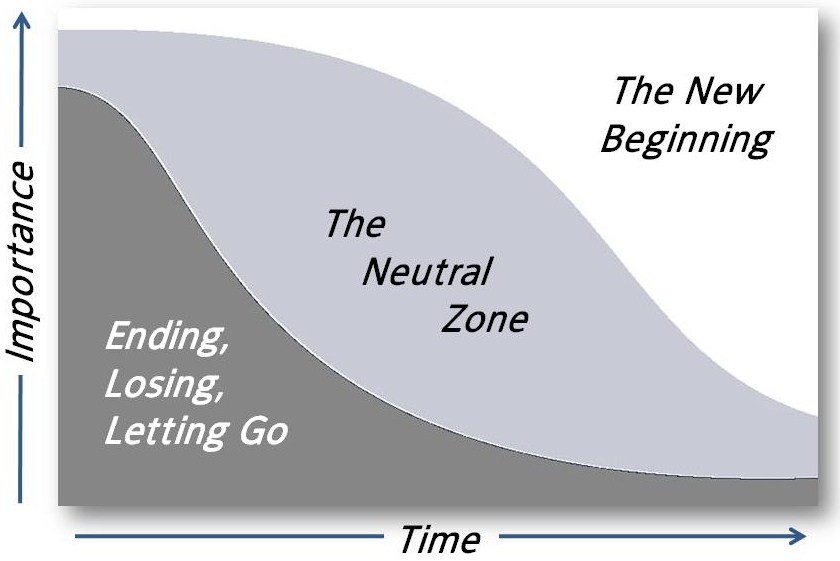As indicated in the introduction, change resembles the end of something familiar and the beginning of something new. The change period can therefore be divided into three stages:
- The Ending
- The Neutral Zone (Transition)
- The Beginning

Click here to watch a video clip that explain the three phases.
Emotions are at their highest level when a significant change is first implemented in an organisation, and high levels of emotion can devastate the organisation’s productivity.
Ending signify the loss of something. Even when the change is positive it is not uncommon for employees to experience a sense of loss.
When a major shift/restructuring or change occurs in an organisation, employees tend to experience several types of losses:
Security - Feeling that you do not know for certain what will happen with you/your position, etc. Feel insecure and uncertain as to what the future holds.
Competence - With a new job/structure/processes, etc., you may feel unsure as to how to complete the tasks. It is hard not to know how to do something, especially if you are in a senior position.
Relationships - The familiar contact with people like old customers, co-workers or managers may be disrupted. People often lose their sense of belonging to a particular team, group or section.
Sense of direction - Employees lose their understanding of where they are going and why they are going there. The vision of where they are going as well as the objectives they have to meet in order to get there, becomes vague and uncertain.
Territory - Employees often experience feelings of uncertainty about the work environment that used to belong to them. Territory includes psychological space as well as physical space.
Most employees react to endings with DENIAL and RESISTANCE. They experience different emotions and management will need to identify these emotions as symptoms of the employees being in the ending phase.
Here are some of what you may expect to see:
Denial -
- “This can’t be happening!”
- “This is just a routine layoff. After the recession, everything will be back to normal.”
- “We don’t have any problems with morale here.”
- “Business is business. After the initial shock, we adjusted very quickly.”
Grief/Loss -
- “I wish we could just go back to how it used to be around here.”
- “Those people who were laid off were my good friends. I really miss them.”
- Anger - “Those rotten $@%&*X!! How could they do that, after all those people have given to this organisation!”
- Guilt - “Why did I get to keep my job when so many fine, deserving people lost theirs?”
Fear -
- “I wonder if I will be next?”
- “I’d better not make any waves or any risky decisions. Best to play it safe.”
Passivity - “Why make any extra efforts if I might be on the way out too?”
Anxiety - “I’m not sure I really have what it takes to adjust to the new way of doing things.”
Confusion - “I’m no longer sure how I fit in, what’s going on around here, or what I’m supposed to do.”
Distrust - “I thought as long as the organisation was doing OK and you were doing a good job, you had a job as long as you wanted. Just goes to show you can’t believe anything management tells you.”
Burnout - “I put in unbelievably long days, six or seven days a week, can’t sleep, don’t have time for exercise, family or anything else, have trouble concentrating, feel overwhelmed – but hey, I’m lucky. I still have a job and I intend to do what it takes to hang onto it.”
Depression - “I have no say over what happens to me. I am completely at the mercy of this organisation and events beyond my control.”

Not everyone will experience all these reactions. Some people, for example, may be quite relieved to see the organisation take steps to be more effective. Nonetheless, most people will experience some combination of many of them, with differing degrees of severity and they may be expressed in many ways. Altogether, they add up to lowered morale.
Click here to hear John Kotter, international change expert, talk about the importance of acknowledging people’s emotions (heart) in the change process.